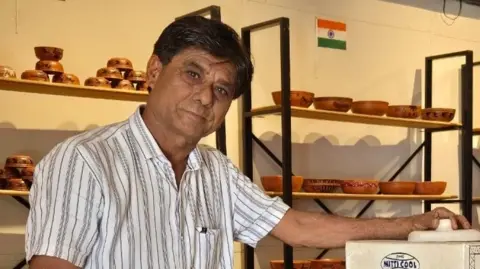**Frugal Tech: Start-Ups Creating Affordable Innovations for Everyone**
In the ever-evolving landscape of technology, frugal innovation plays an essential role in responding to pressing needs without the burden of excessive costs. Start-ups like those founded by Mansukh Prajapati and Bijayshanti Tongbram underscore the transformative power of innovative, cost-effective solutions designed to uplift communities, especially in resource-constrained settings.
Mansukh Prajapati’s journey began in Morbi, a city in western India, where he grew up surrounded by the family pottery business. His father’s craftsmanship in creating clay pots laid the foundation for Mansukh’s later endeavors. Due to the traditionally low income tethered to the art of pot-making, he grappled with societal stigma, as families were often reluctant to marry into potter households. Despite these challenges, he remained committed to his family’s legacy.
A catastrophic earthquake in Gujarat in 2001 became a catalyst for change in Prajapati’s life. Following the disaster, local media highlighted how essential clay pots were likened to “the poor people’s fridge.” Inspired by this notion, Prajapati set out to create a clay-based refrigeration solution that didn’t require electricity. He endured numerous setbacks and financial hardships—including accumulating significant debt—before finally developing the MittiCool, a clay refrigerator that utilizes the natural cooling properties of water permeating through clay.
This innovation, priced at a mere $95, not only provides a functional solution to food preservation but also comes with the potential to revolutionize how low-income families access cooling technology. Prajapati’s entrepreneurial spirit is evident; he now employs 150 individuals and has expanded his product line to include other clay items such as cookware and water filters. His story embodies the essence of frugal innovation—a pathway that fosters job creation while enhancing local economies.
Similarly, in the northeastern state of Manipur, Bijayshanti Tongbram is embarking on an inspiring journey that blends environmental sustainability with socio-economic empowerment. Living in Thanga village, home to one of India’s largest freshwater lakes, she noted the waste generated from lotus stems, often discarded after the flowers were harvested for religious offerings. As a trained botanist, Tongbram developed a process to extract usable fibers from these stems, leading to the creation of unique scarves and garments.
Guiding a team of 30 women, Tongbram has elevated their economic status, allowing them to earn a living through this sustainable enterprise. While weaving a single scarf requires 9,000 lotus stems and takes around two months, the effort is well-compensated—individuals earn approximately $80 per month. Tongbram emphasizes that her initiative goes beyond mere fashion; it empowers women in her village to explore opportunities outside traditional roles while generating income.
Despite the success of these initiatives, they aren’t without hurdles. According to Professor Anil Gupta, who heads the Honeybee Network supportive of grassroots entrepreneurs, many rural entrepreneurs face significant challenges accessing funding and resources. Loans and government schemes are often out of reach for these innovators, leaving them without the necessary financial framework to scale their businesses effectively.
In Karnataka, Girish Badragond is developing a device tailored for blind and partially-sighted farmers, known as the smart farming stick. By employing soil sensors and weather data that relay information through audio messages and vibrations, this invention aspires to empower visually impaired individuals to independently navigate the farming process. Badragond, like many aspiring entrepreneurs, hopes to attract support and funding to transition his prototype into a commercially viable solution.
The collective stories of Prajapati, Tongbram, and Badragond illuminate a pivotal shift in the entrepreneurial ethos across India where practical, affordable solutions for everyday issues are not merely dreams but tangible realities. The frugal innovation movement, characterized by necessity-driven entrepreneurship, illustrates the potential these innovators have to positively impact their communities, leading to sustainable economic development while addressing fundamental needs.
Ultimately, the dedication and creativity of entrepreneurs like Prajapati, Tongbram, and Badragond challenge existing paradigms and open new avenues for progress—showing that, with innovation and a focus on accessibility, technology can indeed become a valuable ally in the quest for improved living standards.











